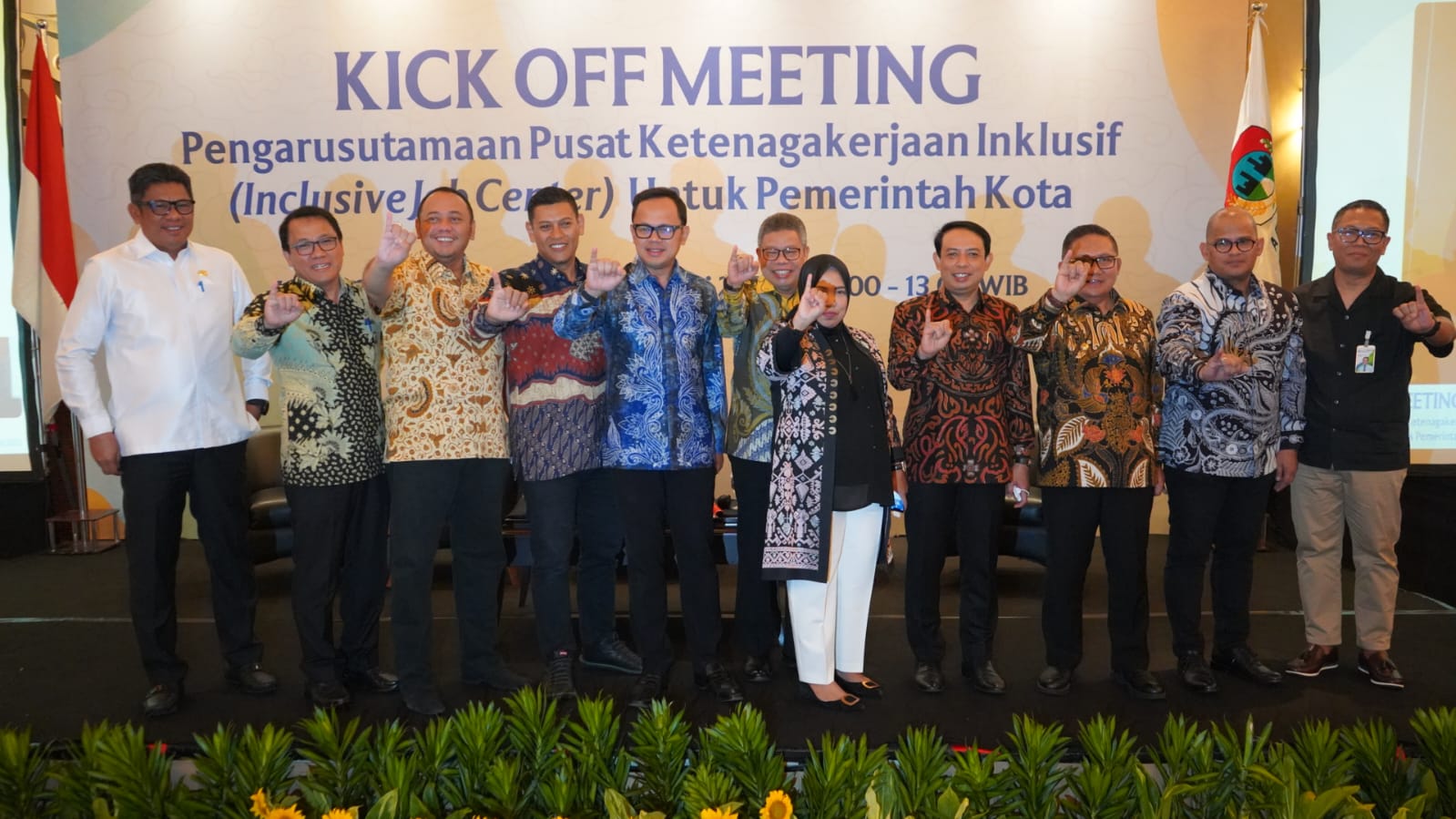
The Association of Indonesian City Governments (APEKSI), in collaboration with the German government’s international cooperation agency for sustainable development (GIZ), held the “Kick Off Meeting for Mainstreaming Inclusive Job Centers for City Governments” on Wednesday at Hotel JS Luwansa Kuningan in Jakarta. The event was conducted in a hybrid format via Zoom in order to allow more access to a wider audience.
The Inclusive Job Center (IJC), developed by the Social Protection Project (GIZ SPP) and BPJS Ketengakerjaan, was introduced as a concept of building an ecosystem that encourages the empowerment and integration of persons with disabilities into the job market. It is expected that initiative will bring more opportunities for disabled people to enter the formal labor market through capacity building, according to the needs of the company and available job opportunities. Essentially, IJC is a tool to create an inclusive labor market (ILM) that provides equal access and opportunities for persons with disabilities and leaves no one behind.
The initiative is in line with Government Regulation No. 60/2020 on the Disability Service Unit (ULD) in the Employment Sector, which requires local governments to establish ULDs and provide quality services for persons with disabilities to access jobs. The meeting also highlights the importance of IJC and its ability to be disseminated to city governments, because local governments have an important role in providing services to persons with disabilities to obtain equal employment rights.
“Our problem has been [an inability] to maximize the demographic bonus, including how to properly facilitate colleagues with disabilities and other vulnerable groups. Inclusive cities are expected to […] facilitate all components of citizens, including colleagues with disabilities, by opening up economic resources and livelihoods that can be accessed equally,” said chairman of the APEKSI Management Board and Bogor Mayor Bima Arya Sugiarto.
“The Inclusive Job Center is a good concept that is expected to be able to assist local governments in facilitating colleagues with disabilities in building an inclusive job market. If it is built in a pentahelix manner, it will not only create demand for job opportunities but also contribute to improving skills. It is hoped that people with disabilities will also contribute to the Indonesian economy toward Golden Indonesia 2045,” he continued.
It was revealed that the event was attended by 157 participants, consisting of APEKSI officials, relevant ministries, local government associations, organizations of persons with disabilities, CSOs, BUMN, the private sector, universities/research institutions and the media.
The meeting also marks the start of the Inclusive Employment Center Mainstreaming Program for City Governments. In addition to the hybrid event, the program also consists of the preparation of guidelines, production of educational/campaign materials in the form of infographics and videos, training, national seminars, radio talk shows and a consolidation forum that will implemented until February 2023. The program is also done in collaboration with the Working Group Toward an APEKSI Inclusive City, which was formed in 2017.
Cut Sri Rozanna, director of the GIZ Social Protection Program, said the IJC was held to convert people with disabilities who were recipients of economic assistance into economic contributors in Indonesia. Furthermore, it was hoped that the event would empower them, as the basic principles in implementing IJC are integrated and comprehensive empowerment from upstream to downstream, sustainability and protection.
Isnavodiar Jatmiko, deputy director of service and channel development for BPJS Ketengakerjaan said, “Almost 30 people a day experience work accidents. We go through the Return to Work Program as an initial effort to build an Inclusive Job Center.”
Meanwhile, Edy Supriyanto, chair of the SEHATI Foundation, said the center could help eradicate extreme poverty in the country.
Wahdi Siradjuddin, mayor of metro as chair of the Working Group Towards Inclusive Cities APEKSI emphasized that issuing regional regulations was not enough for local governments and that real action was needed in the form of providing equal space and opportunities for all. APEKSI, through this program, is not only for the 28 Pokja cities, as efforts have been made to invite all city governments so that they are ready to become inclusive cities in the future.
Source: Jakarta Post
- Home
- |
- Microsite
- |
- Inclusive Job Center
- |
- Press Release Kick Off IJC...
